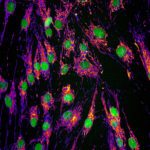Link to Pubmed [PMID] – 26247782
PLoS Genet. 2015 Aug;11(8):e1005423
We have studied the in vivo role of SLIRP in regulation of mitochondrial DNA (mtDNA) gene expression and show here that it stabilizes its interacting partner protein LRPPRC by protecting it from degradation. Although SLIRP is completely dependent on LRPPRC for its stability, reduced levels of LRPPRC persist in the absence of SLIRP in vivo. Surprisingly, Slirp knockout mice are apparently healthy and only display a minor weight loss, despite a 50-70% reduction in the steady-state levels of mtDNA-encoded mRNAs. In contrast to LRPPRC, SLIRP is dispensable for polyadenylation of mtDNA-encoded mRNAs. Instead, deep RNA sequencing (RNAseq) of mitochondrial ribosomal fractions and additional molecular analyses show that SLIRP is required for proper association of mRNAs to the mitochondrial ribosome and efficient translation. Our findings thus establish distinct functions for SLIRP and LRPPRC within the LRPPRC-SLIRP complex, with a novel role for SLIRP in mitochondrial translation. Very surprisingly, our results also demonstrate that mammalian mitochondria have a great excess of transcripts under basal physiological conditions in vivo.

